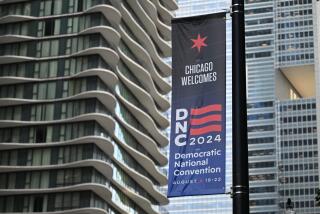Iowa Caucuses Blend Theater, Neighborliness as Presidential Stew
- Share via
DES MOINES — Start with a dash of political theater, add neighborhood ties for flavor and top with a mixture of confusion and high jinks. The dish, served up fresh every four years, is Iowa’s precinct caucuses.
The caucuses are not quite a primary. But as the traditional beginning of the presidential election season, they once again have lured the field of contenders who would have their party’s presidential nomination.
But even the most committed supporter of the caucus system has to pause when asked to explain details.
“They lean to the improvisational side of things,” Iowa Democratic Chairman Michael Peterson said.
First, the basics.
The name of the game in seeking the presidential nomination in Republican and Democratic politics is to accumulate delegates to the national nominating convention. In most states, those delegates are picked by voters casting ballots in a primary.
It’s not that simple in Iowa, where they begin a months-long process with precinct-level caucuses.
On Monday, caucuses will be held in each of the state’s 2,142 precincts. Both Republicans and Democrats will hold those gatherings, but since no one is challenging President Clinton, the spotlight will be on Republicans.
The caucuses are neighborhood meetings held in fire stations, church basements, private homes or wherever party leaders can find a room for activists to get together. They are an election in name only.
Attendance will range from three people to a couple of hundred.
At 7 p.m., the meetings are gaveled to order, and someone is elected to take charge. Then, like good political activists, they focus on the issues of the day.
On the Republican side, a ballot is distributed, and the activists get to pick their favorite for the party’s presidential nomination. Unlike Democrats, the Republicans use a secret ballot for what is, in fact, a straw poll.
That secret ballot is about the only nod to what passes for a traditional election--and it’s not binding on the delegates chosen for the next level, the county conventions, the official purpose of the Monday gatherings. Voters accustomed to showing up at polling places and casting votes in private would be stunned by a caucus.
Lobbying, vote-swapping and scheming are the order of the day. Local political ambitions are often mixed with presidential politics.
And since the events are run by the two party organizations, such maneuverings often get in the way of a strictly by-the-book process.
“In 1980 and 1988, information was never reported from some precincts,” reports an official history of the caucuses compiled by state election officials.
Since neighbors are doing this in full view of one another, emotions can run high.
Peterson, the Democratic chairman, recalls his first caucus as a college student, when then-President Carter was facing a challenge from Sen. Edward Kennedy (D-Mass.).
“It didn’t come to fisticuffs, but it was darn near that,” he said.
But it’s not all quarrels.
“People just kind of sit around and drink coffee and it’s a social event,” Iowa Democratic Party spokesman Peter Willmert said. “People even stop in.”
News organizations, meanwhile, are tabulating the count and reporting the results around the world. Political careers are made and broken.
Whatever their flaws, the caucuses are the first event where a significant number of people get together and voice a preference.
Republicans think about 130,000 of the state’s 584,118 registered Republicans will show up.
You don’t have to be a Republican to attend and cast a ballot. Anyone who cares to declare an allegiance to the party for an evening can attend, though there isn’t a big history of crossover participation.
Democrats don’t have a real contest this year, but Vice President Al Gore, First Lady Hillary Rodham Clinton and the president himself have visited the state to stir up interest. Democrats expect 25,000 participants.
After the initial “voting,” the caucuses continue to operate.
Activists attending the caucuses turn their attention to the task of electing delegates to the next round of meetings--conventions in each of the state’s 99 counties.
At those meetings, delegates are elected to congressional district conventions. The process culminates with a state convention in the summer, where delegates to the national nominating convention are picked. Those delegates may be pledged to someone totally different than the person who wins the straw poll Monday night.
That’s getting ahead of the story, however.
At the precinct caucuses, activists must focus on electing representatives to the county central committee that runs local party affairs. And then there are those pesky debates on resolutions that are forwarded to the state party for possible inclusion in the issues platform.
“The very hard-core activists sit around until the very late hours discussing whether we should repeal the Panama Canal treaty or something,” said Brian Kennedy, Iowa Republican chairman.
More to Read
Get the L.A. Times Politics newsletter
Deeply reported insights into legislation, politics and policy from Sacramento, Washington and beyond. In your inbox twice per week.
You may occasionally receive promotional content from the Los Angeles Times.









